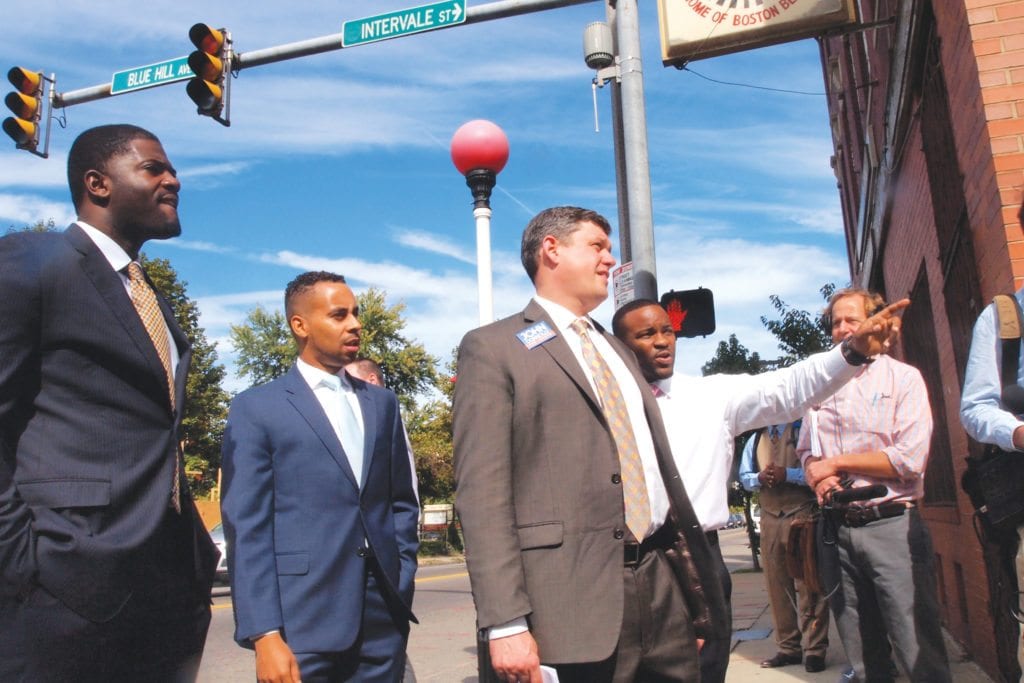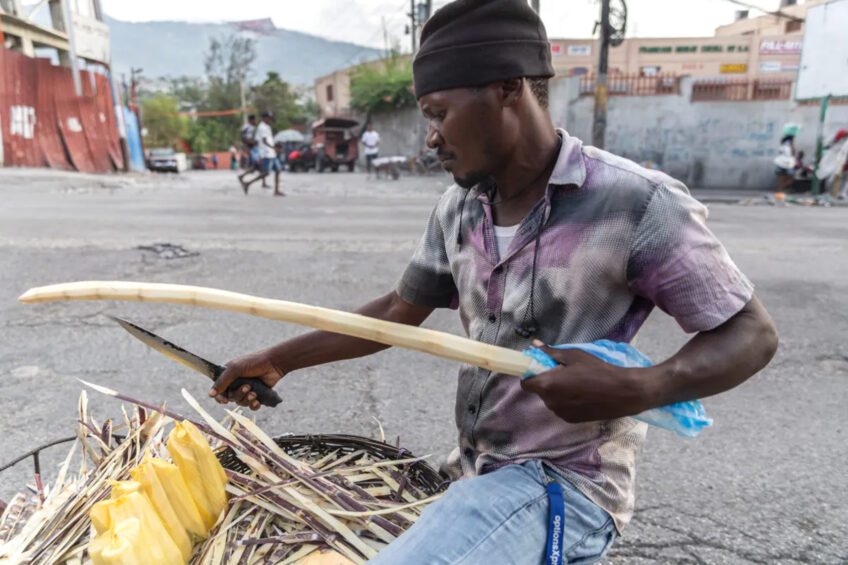John Connolly, Marty Walsh compete for support from blacks, Latinos in Boston mayor’s race


Author: Yawu MillerState Rep. Mary Walsh greets commuters at the Dudley Station bus terminal. Walsh and fellow mayoral candidate John Connolly have just four weeks till the November 5 election. (Yawu Miller photo)
In the mayoral preliminary, the challenge for any of the serious contenders was in securing and turning out their respective voter bases. The two candidates most successful in that game — Marty Walsh and John Connolly — advanced to the final election.
Connolly relied heavily on the predominantly white neighborhood of West Roxbury, where he resides, Walsh on South Boston and the predominantly white precincts in Dorchester, where he lives.
Between their neighborhoods live the majority of Boston’s communities of color — African Americans, Latinos, Cape Verdeans, Vietnamese and Chinese. Add in the progressive-voting whites who populate Jamaica Plain and the South End, and you have a near-complete list of the constituencies for whom Connolly and Walsh must now contend.
“The communities of color vote is a game changer,” Walsh says.
Both candidates desperately need to change their game. Neither had more than a thin sliver of votes in the city’s predominantly black and Latino precincts in the preliminary.
“Both candidates have a lot of work to do,” said State Rep. Jeffrey Sanchez, whose district includes parts of Jamaica Plain and a sliver of Brookline. “The next few weeks will be very interesting.”
To reach black, Latino and Asian voters, the candidate will have to speak to their issues, Sanchez says. That means they will have to address a wide range of issues, including crime, educational disparities and economic disparities.
“There’s a lot of prosperity in this city,” Sanchez commented. “We want to make sure that prosperity is flowing in the heart of the city as well.”
The tension ratchets up this week as key community groups and individuals make endorsements. At large City Councilor Felix G. Arroyo and former Dudley St. Neighborhood Initiative executive director John Barros were the first out of the starting blocks with an endorsement of Walsh’s campaign.
At the Banner’s press deadline, a coalition of community-based organizations called the Community of Color Leadership Group was scheduled to meet at the Boston Teachers Union headquarters in Dorchester.
Coalition members said they planned to review Walsh and Connolly’s plans for tackling a list of issues including educational disparities and school assignment policy, gun violence, police profiling and housing development.
“They need to make concrete commitments,” said Mariama White Hammond, executive director of Project Hip Hop, a youth organizing group. “Neither of the candidates has deep ties to our community. We need to know who’s going to work with our community, who’s going to put people of color in top positions that can move things forward.”
In addition to the community coalition, several mayoral candidates and black and Latino elected officials may make endorsements in the next week or two.
Meanwhile, Walsh and Connolly have been staking out territory. Both made swings through Dudley Square, visiting businesses and chatting up commuters passing through the busiest bus station in the MBTA system.
On Monday of last week, Walsh was surrounded by a phalanx of volunteers and reporters as he passed through the station before walking the streets in Dudley Square, while volunteers fanned out with campaign literature.
That evening, Walsh met with voters in one of his Mondays With Marty weekly convenings at the Reed Auditorium on Talbot Ave.
Last Thursday, Connolly made a tour of businesses in Grove Hall, covering Warren St. and Blue Hill Ave., discussing the challenges and opportunities facing entrepreneurs in the shipping district.
Outside a vacant building on Blue Hill Ave. Connolly listened intently as Dorchester resident Eric Brown complained about prostitution on the avenue.
“We want to crack down on the johns,” Connolly said. “We want to work with the women to get them in a better situation.”
He stopped in a pizza shop and offers to buy drinks for the gaggle of campaign volunteers and reporters trailing him. Outside on Warren St., he stops to talk to a Cambridge resident about the importance of including arts, music and physical education in students’ school days.
“You get them half the year or only once a week,” he says. “We have to change that.”
Last Friday at the El Mundo Hispanic Heritage Breakfast, an event modeled loosely after the annual St. Patrick’s Day roast, both candidates worked the room, delivered snappy one-liners and passed each other at the door, Connolly leaving while Walsh awaited his turn at the podium.
Both elicited laughs and cheers from the mostly Latino audience.
Saturday of last week, Connolly opened a campaign office on Washington St. near Martin Luther King Blvd.
At the end of his first full week of campaigning citywide, Walsh said he has gained a deeper understanding of the challenges facing Boston residents.
“I’ve know there’s an issue of poverty and a gap between the rich and the poor,” he said, “but it’s bigger than anyone can imagine.”






